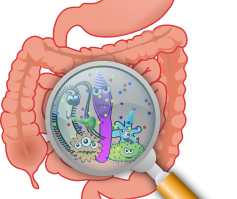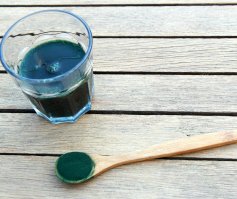 The fruit and vegetable diet was developed by Dr. Ewa Dąbrowska. This is an innovative method recommended by its author, especially when pharmacological treatment does not bring the expected results.
The fruit and vegetable diet was developed by Dr. Ewa Dąbrowska. This is an innovative method recommended by its author, especially when pharmacological treatment does not bring the expected results.
Contemporary diet and diseases of civilization
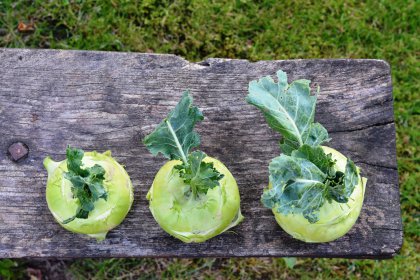 Today's food does not resemble that of decades ago. We consume more and more highly processed, refined products (devoid of fibre, microelements and vitamins), food is subjected to high temperatures, which causes the destruction of enzymes and changes in the structure of proteins.
Today's food does not resemble that of decades ago. We consume more and more highly processed, refined products (devoid of fibre, microelements and vitamins), food is subjected to high temperatures, which causes the destruction of enzymes and changes in the structure of proteins.
There seems to be no other reason for such a rapid increase in the incidence of cancer, infarction or diabetes.
Our organisms are not adapted to such a drastic change in diet. Their needs have remained the same for hundreds of years. According to the author of the diet, a return to natural nutrition can be an antidote to civilization diseases.
Essence of the fruit and vegetable diet
This is a periodic treatment having the character of fasting. During the diet we provide the body with an appropriate amount of enzymes, microelements and vitamins. We alkalise and detoxify the body, strengthen the mechanisms leading to self-healing, restore health.
Initially, the diet is based on a therapeutic hunger strike, after which solid natural foods are gradually added, mainly vegetables, fruits, grains, legumes and small quantities of zoonotic products.
What does a fruit and vegetable diet look like?
First days
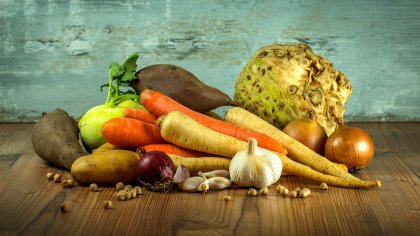 For the first days, up to a few weeks it is advisable to eat low starch vegetables, i.e. root vegetables (carrots, beetroots, celery, parsley, radishes), cabbage (cabbage, cauliflower, broccoli), onion (onion, leek, garlic), cucumber (pumpkin, cabbage, cucumber), solanaceous (tomato, paprika), leafy (lettuce, parsley, herbs).
For the first days, up to a few weeks it is advisable to eat low starch vegetables, i.e. root vegetables (carrots, beetroots, celery, parsley, radishes), cabbage (cabbage, cauliflower, broccoli), onion (onion, leek, garlic), cucumber (pumpkin, cabbage, cucumber), solanaceous (tomato, paprika), leafy (lettuce, parsley, herbs).
During this period you can also take small amounts of low sugar fruits: apples, grapefruits, lemons and small amounts of berries.
Dr. Dąbrowska recommends green juices from green plant shoots, e.g. parsley, celery, botvin, dandelion, nettle, sorrel, broccoli, cabbage, lettuce, alfalfa germ, wheat grass. The juices are rich in chlorophyll and its structure is similar to haemoglobin. Enzymes contained in juices have a purifying effect, detoxify the body, renew blood, accelerate digestion, deacidify, provide oxygen, energy, vitamins and minerals.
Drinks recommended during the diet include water, fruit and vegetable juices, fruit and herbal teas, sugar-free compotes, vegetable broths. The diet can be enhanced by fruit and vegetable slimming cocktails.
Do not consume bread, groats, oil, etc. You also have to give up coffee, tea, alcohol and smoking.
Indications for persons taking medication on a permanent basis
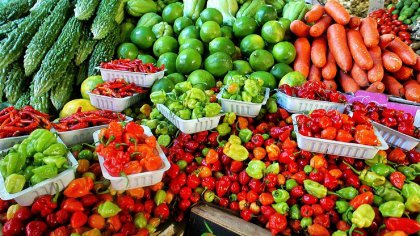 Persons who take permanent medication should, in particular, control their health during the period of their diet, as the side effects of pharmaceuticals may manifest themselves. The diet normalizes blood pressure and sugar levels, therefore the doses of hypotensive, diuretic and diabetic drugs should be gradually reduced.
Persons who take permanent medication should, in particular, control their health during the period of their diet, as the side effects of pharmaceuticals may manifest themselves. The diet normalizes blood pressure and sugar levels, therefore the doses of hypotensive, diuretic and diabetic drugs should be gradually reduced.
The fruit and vegetable diet does not contain cholesterol, which leads to lower cholesterol content in the blood. People who take cholesterol lowering drugs should monitor their cholesterol levels and reduce their medication as they fall.
Drug intake and body reactions should also be observed by people taking anticoagulants or insulin.
Any changes in the taking of medicines should be carried out under the supervision of a physician.
Movement during the diet
The author of the fruit and vegetable diet recommends as much exercise as possible, including walks, gymnastics, eye exercises according to Bates, swimming, gym, etc. Movement supports the excretion of toxins from the body and is therefore a natural ally of the diet.
Who is a fruit and vegetable diet for?
This diet can be used by people who want to cleanse the body of toxins, gain additional energy, improve the quality of sleep, increase the efficiency of the body, improve the efficiency of the mind. Diet is especially recommended for people with:
- weakened immunity: frequent bacterial, viral, fungal infections, allergies such as hay fever or asthma, as well as food intolerances such as migraine, muscular pains, auto-aggression diseases such as rheumatoid guests, Hashimoto thyroiditis, hepatitis, visceral lupus, "dry eye" syndrome, as well as skin diseases such as psoriasis, acne, skin porphyria, dry skin, eczema etc., etc,
- neurological diseases: epilepsy, ischaemic strokes, memory disorders, neurosis, agitation, Parkinson's disease, multiple sclerosis,
- endocrine diseases such as: menstrual disorders, climacteric disorders, hypothyroidism, thyroid nodules, high prolactin or excess estrogens, ovarian cysts.
According to Dr. Dąbrowska, diet can also be effective in treating infertility and recurring miscarriages. Another disorder that disappears under the influence of changes in dietary habits on natural foods is metabolic syndrome X, concerning people suffering from obesity, hypertension, type II diabetes, coronary heart disease, adult bypasses, thrombosis, edemas.
This diet can help in case of osteoarthritis, periodontosis, cataracts, varicose veins, gastric ulcers, polyps, etc. The diet can also help in case of osteoarthritis.
Who should not follow a fruit and vegetable diet?
People should give up this diet:
- suffering from dietary anxiety, which is difficult to control, and which triggers stress reactions in the body, which make it impossible for self-healing mechanisms to join in.
- using drugs that inhibit the immune system, such as steroid hormones or cytostats, as well as posteridic or autoaggressive adrenal insufficiency (Adison's disease).
- suffering from debilitating diseases such as: extreme organ failure, cancer at the advanced stage, conditions associated with increased metabolism such as hyperthyroidism, pregnancy, feeding, in small children, in girls during adolescence. Diet is contraindicated for organ transplants such as kidneys and severe depressions.
End of the hunger strike
After the end of the treatment, we gradually include wholesome food, natural, mainly of plant origin, unprocessed. Periodic fasting should be used regularly, e.g. 1-2 days a week or 1 week a month.



